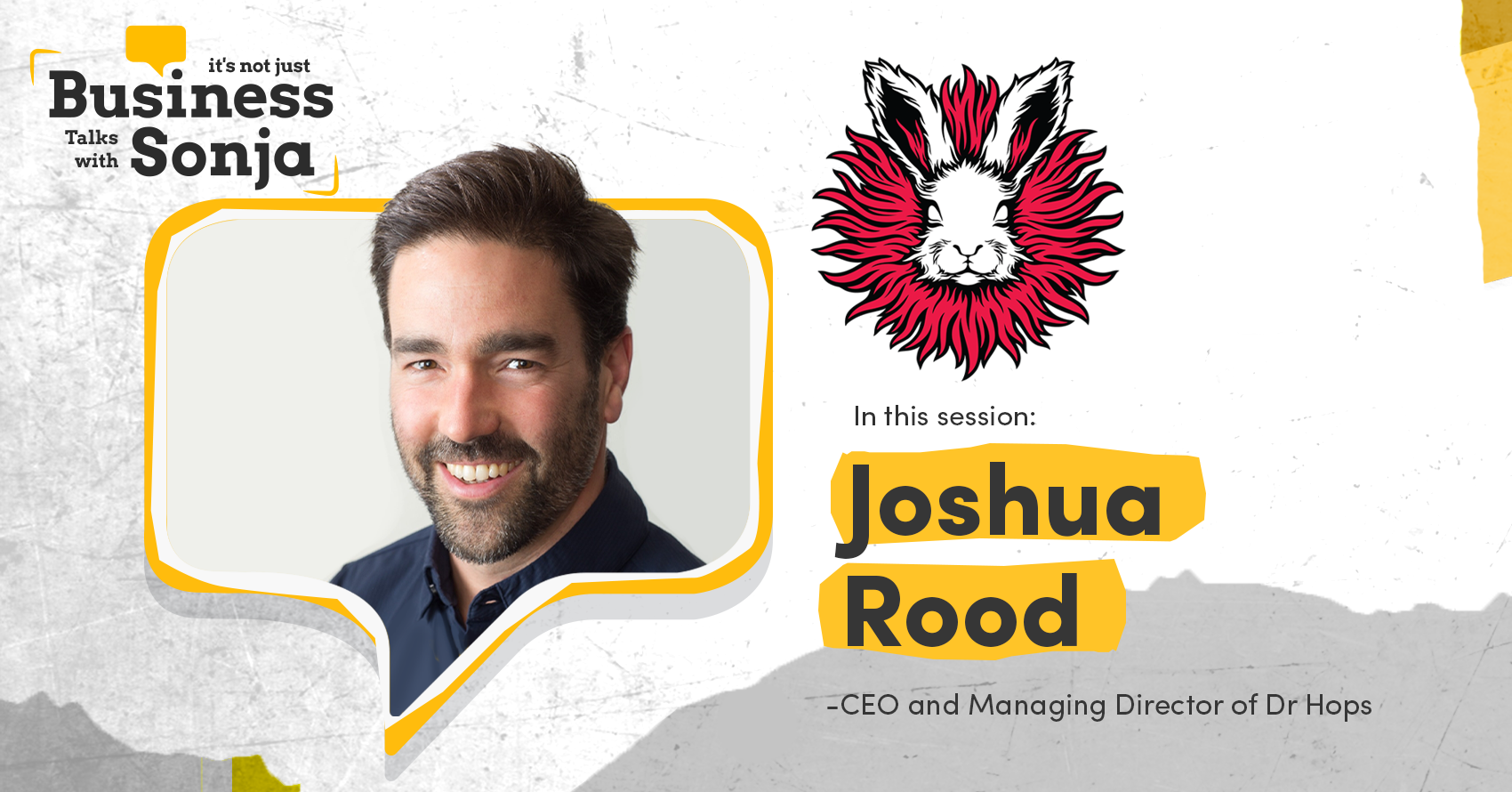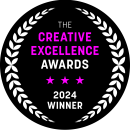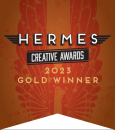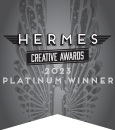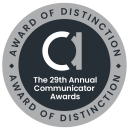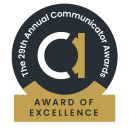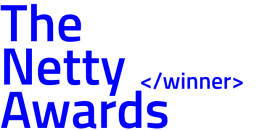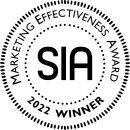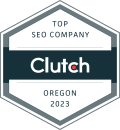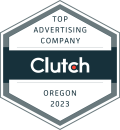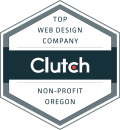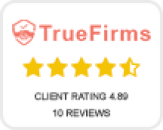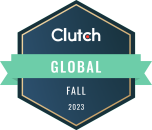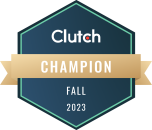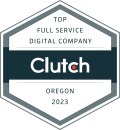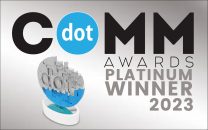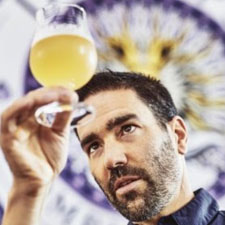
Joshua Rood is the Co-founder and CEO of Dr Hops Real Hard Kombucha. Dr Hops combines alcohol-tolerant kombucha cultures with the world’s finest organic, fair-trade ingredients for a great-tasting, health-conscious alcohol. Dr Hops contains no extracts, “flavorings,” GMO ingredients, glutens, or pasteurization.
Before founding Dr Hops, Joshua was an Assistant Store Manager and Community Team Lead for lululemon Athletica and a Course Supervisor for Landmark Education. Joshua has worn multiple hats throughout his career, including musician, bartender, and chef at a yoga retreat center.
Here’s a glimpse of what you’ll learn:
- Joshua Rood shares the conversation that sparked the creation of Dr Hops
- Learn the four requirements for the new kombucha: probiotic, gluten-free, 8% alcohol or greater, and awesome
- How did Joshua find advisors to lead Dr Hops to success?
- Joshua discusses his involvement with the Landmark Organization and why community matters to him
- The rabbit that inspired the brand name
- Challenges of growing a brand independently during a pandemic
In this episode…
Imagine an alcoholic beverage with no extracts, “flavorings,” GMO ingredients, glutens, or pasteurization. Sounds impossible, doesn’t it?
Dr Hops Real Hard Kombucha proves it is possible: a health-conscious alcoholic beverage with exceptionally wonderful taste. It’s magical and a bit mysterious, like the White Rabbit in Alice in Wonderland or the children’s story The Velveteen Rabbit. How can something that tastes amazing also be good for you? Dr Hops shows that anything is possible when a community comes together to change the world — or at least the alcoholic beverage industry.
In this episode of It’s Not Just Business Talks with Sonja, Sonja Anderson sits down with Joshua Rood, Co-founder and CEO of Dr Hops Hard Kombucha, to discuss his path to creating a magical new beverage. Joshua shares the conversation that sparked the idea for Dr Hops, the rabbit who inspired the brand’s name, and why he is passionate about partnering with his community.
Resources mentioned in this episode:
- Joshua Rood on LinkedIn
- Dr Hops Hard Kombucha
- Alex Lewin on LinkedIn
- The Fermentation Association
- Ahmed Rahim on LinkedIn
- Dr Hops Advisors
- Landmark Worldwide
- Sonja Anderson on LinkedIn
- zo.agency
Sponsor for this episode…
This episode is brought to you by zo agency, a tight-knit team of online and offline marketing pros.
At zo, we serve as the marketing department for small to mid-sized businesses.
We know that marketing and advertising can be demanding and time-consuming — that’s why we make the process so easy-breezy that you don’t have to sacrifice precious time to get the results you need.
To learn more, visit zo.agency or call (541) 633 4725.
Episode Transcript
Intro 0:04
Welcome to It’s Not Just Business Talks With Sonja, where we get down to the real business of How Great Leaders dug through their own trenches and climbed some epic mountains to get where they are today. Now let’s get started with the show.
Sonja Anderson 0:21
I’m here today with Joshua Rood Co-founder and Chief Rabbit of Dr Hops Real Hard Kombucha. He grew up equally in Maine and California. He has experience in food beverage branding, event management, and transformative education, which we’ll hear about. He embodies a commitment to community excellence and fun and serves as the CEO and Managing Director of Dr Hops. How they do Joshua. Great. Well, wow, it’s I’m super, super stoked to speak with you and a little chance to ask you a couple questions before this and you know the the place that I’m going to begin because there’s so much in your story is how did you start? And I know you we talked just a few minutes ago about Tommy but tell me how you How did Dr Hops come into existence, which is your hard kombucha real hard kombucha, which is unique in and of itself? But how where did this idea come from?
Joshua Rood 1:20
I mean, if you really want the beginning, you have to go way back probably millennia.
Sonja Anderson 1:25
Okay, I love it. Well, you can.
Joshua Rood 1:29
But I think like there was a point in in 2014, when I was working with Lululemon athletic wear company in Berkeley, where Lululemon has really was only in Berkeley for community purposes. It wasn’t a very profitable store. But it was a hotbed of transformed transformation and yoga community. So I was I was managing the community team at the Berkeley store, and I was assistant manager for the store. And I hired hired an awesome person to work on my team who is now Tommy’s wife, she introduced me to Tommy. At that time, in 2014, there was so much creativity happening in craft beer, like it was really exploding. And, and it was starting to happen to booja. Like, I started to see these local kombucha brands popping up in markets all around me. And I, you know, I had been drinking kombucha for five or six years, but probably longer, almost 15 years at that point. But um, you know, all that was happening. And I started to, I discovered there was one other, there was one product in the world that was a alcoholic kombucha. It was from Michigan. It was from Michigan, it was a very quirky, original brand. And I started to just hoard as much of it as I could, and share it with as many people as I could because I thought the idea of it was amazing. Like it was the best idea. And I had a strong background as a bartender and person lots and lots of beverage and food background. And then I had this whole health and yoga background as well. So marriage. Yeah, so it was just so exciting. And then when I got introduced to Tommy, and I, you know, he ended up coming to a big event that I threw up my house. And we ended up getting in a very heated discussion about the pros and cons of this idea. And this product, and he was a brewer, a beer Brewer and a kombucha Brewer. So after this, probably like two hours of heated conversation, we I said, Well look, if you think you can make this really, really great, like as good as a good beer or as good as a good wine, then, then we’re going to start something. So go and go show me what you can do. And that’s
Sonja Anderson 3:58
Wow. And so I mean, first of all define great, because I’ve tasted Thank you, I’ve tasted all of your products that you have out there right now. And I can speak from experience we the overwhelming response to drinking it, any of the flavors and we like the ball is wow. And it’s not just wow. Because it tastes great. There’s a very unique experience, right that the the it’s almost I mean, I just I don’t want to put words in anyone’s mouth or tease anyone on this, but it’s a unique beverage experience. It’s not like just drinking a Pacific a glass of wine. It’s not like drinking a beer. It’s unique. Wouldn’t you say? Josh? I mean,
Joshua Rood 4:45
I certainly would. Yeah. I mean, you experienced it that way.
Sonja Anderson 4:49
Yeah, it’s transcendental in some ways. I really I mean, I don’t have us to explore it. To express it. It was very unique for us and every single one of us, the whole team that had a chance to drink it had that same response. Wow. Um, and maybe a unicorn emoji right afterwards. So um, so how did you decide like, how is this going to be great? Was it the flavors? Is it the experience? Is it what what makes Dr Hops? What it is? What was your vision about? What you said Tommy a way to do?
Joshua Rood 5:19
Yeah, it’s there’s two, two sides to that. Right? The, the, the basic idea was literally on a sticky note that I gave to Tommy. And it just said, probiotic, gluten-free 8% alcohol or a greater? Awesome?
Sonja Anderson 5:41
Do you still have that sticking it?
Joshua Rood 5:43
Somewhere?
Sonja Anderson 5:44
I frame it? Yeah.
Joshua Rood 5:46
So that was the basic idea. I’m like, Look, if you can do all four of these things, like the world wants that. The world wants that. And nobody else can do that. Nobody else is doing. Not those four things not really. So. So. So that was the focus of it. You know, ultimately, as Tommy and I developed it, it took us three years, really just completely behind the scenes. I mean, we were public about what we were doing, but we weren’t really selling anything, right, just three years of product development and learning the business and the licensing and all that stuff. Um, you know, what it became was a very prismatic approach, you know, there’s so many different, you know, somewhat small aspects that go into making a food or a beverage. And my philosophy has been, well, let’s do every single one of them better. Let’s, let’s do it fresher. And, like higher quality, fresher ingredients more alive. And, and, and balanced. And if we can get all that stuff working together in a balanced way, it’s going to be awesome. Mm hmm. And that’s been our focus. Like, we’re not, we’re not a commercial enterprise first, and then a beverage maker. We’re a beverage maker first. And then a commercial. It’s like, we know that there’s a commercial opportunity here. But our passion is for Wow, for the West, what we, if we if we can’t make Wow, and we’re not interested,
Sonja Anderson 7:22
right, with a unicorn emoji, I’m just going to add. I think that was dawn on our team that just was literally Wow, star star, unicorn star star. I mean, this is how we feel about it. And I encourage everyone to have that experience. But I mean, you’re starting from scratch, and you’re, you’re behind the scenes learning the commercial side of the beverage industry. Was that you Josh? Or do you have to dig through and figure out how to get into markets and who to, you know how to ship things from point A to point B. And
Joshua Rood 7:54
that was, Yep, that was me. Mostly, I just wanted Tommy to focus purely on production and formulation and process and because the product, the passion we have for the product is that important. Like, if there’s two people, one of them is just that, like, That’s how important it is. So I did the rest, I did everything else. And, and, you know, because we were starting from scratch, and we don’t have previous experience in you know, consumer packaged goods, at least not as, as high-level executives, or, or, or brand owners, you know, that I went after, you know, a lot of high-level advisors to provide the experience and the framework for where we needed to go.
Sonja Anderson 8:46
Mm hmm. That’s actually brilliant ask, just ask pave the way by asking, because the rest of us, you know, we, we tend to do it by banging your head on the wall until we get an opening? And then well,
Joshua Rood 8:57
I definitely do that.
Sonja Anderson 9:01
And where did how did you find those advisors? I mean, was that just a reach out? Or referrals? Or I’m curious about that for because I just advised my own brother yesterday, the most impressive thing I’ve ever done for my company is to get help get a coach, get get an advisor, get people that know more than you know. But it took me a long time to get to that point. So how did you do that?
Joshua Rood 9:23
I mean, it was a very organic thing that it sprung directly from our, our expressing our values. You know, one of our values is community. And from the very beginning, I always as public and community-oriented about what we were doing as I couldn’t possibly imagine being like, we basically just started having events and sharing what we were making with the people that we loved and for people that we thought would love we were doing or both right? sharing and sharing lots of events at like yoga studios, you know, or other athletic-oriented things or other community-oriented things. and pretty early on, we met fermentation specialist who started just showing up at all these like he was really into fermentation really into food. He started showing up at all of our events. And because we kept having events, he kept getting more and more interested in what we were doing. We are having more and more conversations about it. He ended up being our very first advisor. He then introduced us to one of his best friends who had had been an executive at a beverage company and had done many other interesting things. He then entered introduce us to the co-founder and CEO of Numi Tea, which was a very community-driven Oakland-based business. Yeah. Which I long respected and admired. So it really grew directly, because we were so active in the community sharing and sharing and sharing and sharing, we met these people.
Sonja Anderson 10:56
Right? Absolutely. And, um, do you want to give any of those people names? And I’m curious about if you if you want to give them a shout-out? If not, no worries.
Joshua Rood 11:05
Yeah, yeah, I mean, I know they’re all their value areas of the process and are a huge part of the process. And they’re a huge contribution to where we’re at now and where we want to go. And Alex Lewin was the first person Alex has a couple of books on fermentation of fermented foods and fermented beverages fascinating. And he’s also one of the co-founders of the Fermentation Association, which is fairly young, but very interesting, very exciting organization. Alex introduce us to his buddy, his name is Murat. Murat was the former COO of Adina. Adina was a fairly short-lived flavored water company. Okay, like, early on in the flavored water game. It was it was it was it was run by Greg, Greg Steltenpohl, the guy who started Odwalla
Sonja Anderson 12:02
Oh, interesting. Okay. Yeah,
Joshua Rood 12:03
yeah. And so and then Murat introduced us to Ahmed. Ahmed Rahim is the co-founder, with his sister, of Numi Tea, and Ahmed is still our lead advisor and our biggest champion. Oh, that’s great. But in the industry,
Sonja Anderson 12:21
that’s brilliant. That’s great. And and you’re surrounded by people who clearly, first of all have a passion for the beverage and food industry and have a passion for quality. You know, I mean, I understand those products, quality community, because they came around you with community which, you know, that’s priceless. Great stuff. So tell me actually, Joshua, you we bring community up a lot. And it’s a really core part of what your company is and who you are as an individual. And you also are a part of the Landmark Forum and Landmark organization, do you want to canoes espouse a little bit more about that whole what your thought processes and what your what your what your feelings are about this sense of community that’s so important to
Joshua Rood 13:07
you? Yeah, Landmark is an extraordinary organization that is committed to both personal and professional, like growth, and training and development and transformation. And if you really dive into personal transformation, doesn’t take very long before you discover that the individual is a tiny part of what personal transformation is all about. Right? And pretty soon you get from, you know, individual to like partnership, like marriage, or a friendship or any kind of partnership, then you get to family, you know, bang, now you’re talking five to 10, 15 penny that you spend, you get to community, you know, you get these ever larger levels of who we are the world. And so Landmark, that’s what they do, they address transformation on all those levels, all the way up to world. I mean, they don’t really go beyond world. We don’t we don’t have access to that really right now, but not not any obvious access. But, uh, but in doing all that work, and I and I’ve trained myself to lead those programs as well. So I’m really immersed in it. And so Dr Hops grew out of all of that work and that love and that commitment to who we really are as human beings. Yeah. And, and so Dr Hops is an expression of that. And, and even though, you know, Tommy didn’t have that same background, and he’s done some Landmarks programs now, but he had his own. He has a very, a very authentic and very deep appreciation for all of that world in his own right. So when we got together we talked about Well, what do we want Dr Hops to be about? And those conversations were absolutely seminal. And you know, community was one of the things one of the values we identified as though this is you know, when you look at when you look at core values either for an individual or an organization, these are things that you that you will not proceed without, like you will you are not willing to sacrifice these things, or they are not worth it. Yeah, their core. So community is one of those things and fits us of course, because we make it an alcoholic beverage, which is by nature social.
Sonja Anderson 15:35
Well, yep. I mean, the thing that keeps striking me is your your beverage is all beverages. Also, our art field transcendental, which is a lot about what’s going on in transcendental versus transformational. I mean, literally going back to wow, emoji unicorn, there’s something that doesn’t just come through on your, on your philosophy and your core values. But in the actual consumption of the beverage, it goes all the way through, um, which is, you know, taking your core values all the way to the finish line. That’s pretty impressive. Yeah, that’s
Joshua Rood 16:11
definitely my intention all the way down.
Sonja Anderson 16:15
And so the interesting thing about your, your, and I’ve looked, you know, we’ve looked, we talked about your brand at length in history previously, and one of the one of the key brand elements, of course, is the rabbit. And, um, you know, for some people, that’s just a rabbit, but that certainly, there’s a lot more that you learned along the way. And I think you mentioned you got some of that from your wife, Lisa. But tell us why the rabbit and why does that matter and a little bit about that part of the
Joshua Rood 16:43
story. You realize there’s like a novel about every aspect.
Sonja Anderson 16:51
I know you can only scratch the surface on all of these little elements. We’ll have to have you back. And then the next thing is everybody just needs to drink. Dr Hops. Yeah. And then we’ll all know, they won’t even need to hear this. They’ll just know. They still need.
Joshua Rood 17:08
You know, these these things are stories, right? Yeah, we are. We are stories. But this one, this is a very special part of cops, because first of all, my wife is probably the most loving and supportive human being on the planet. Wow, good. And she’s also, you know, also trained at Landmark in how to how to do that effectively. But um, she, you know, I met Lisa in 2008, or something like that. 2007 2008. And, you know, we recognized very early that we were a perfect partnership, we wanted the same things. We were committed to the same things we had, we could offer each other exactly what we each need. So, so. So it didn’t take us very long. You know, it was probably a year until we were married or something. But somewhere in there, she. She said, Joshua, we’re going to get a rabbit. And I’m like, What do you mean? I found this rabbit. It’s a very particular breed. very finicky. Most people aren’t going to be able to take care of this rabbit. He was rescued from a park. Like this rabbit needs me. I’m like right. Okay, let’s get a rabbit. So we ended up with this rabbit. It was a it’s a little rabbit. Like you know, yeah, four four pounds or something like that almost offer. lion head rabbit is the name of the type of rabbit okay, and that rabbits name was Dr Hops. No kidding. And that wasn’t even RNA. Somebody else brilliant had already given her the name Dr Hops. So we got Dr Hops, and I started learning about rabbits and then you know, five or six years later when I was talking to Tommy about this idea, and Tommy and I from the beginning wanted to make a beverage that again because it honored the awesomeness that was happening in craft beer and it on honored the awesomeness that was happening in kombucha and like CPG. And, and we loved hops. We weren’t going to make a marijuana product we were going to make something that was overtly legal. And hops are the closest thing like hops are these sanely aromatic beautiful terpene rich Lupo Lupul ins and so, I don’t know Dr Hops is perfect, she was the cutest thing ever. She was a, you know, really for me and homage to to Lisa, and to Lisa’s love for creatures and world. And, and, and, and, you know, she was clever, I mean clever in terms of a rabbit.
Sonja Anderson 19:57
And so that was actually and there’s some I mean there’s a lot of I think you I think you’re the one that told me that there’s some there’s a lot of magic in the lore of rabbits as well. Do you want to tell me a little bit more about that because you’re the one I think that brought that to my attention and that just to me made so much sense to go again with this with this hard kombucha which is already got these magical feels like magical qualities to it. That you have a rabbit as part of the brand.
Joshua Rood 20:27
Yeah, yeah. Funny thing is Tommy turned out to be a rabbit person. How random is that? We had a rabbit named Angie will a beautiful white rabbit. Darker. She’s one of those white rabbits the dark eye shadowy eyes very, very beautiful. And yes, is it like I started really sink my teeth into that when definitely no pun intended there. When we started developing the idea for the business because yes, we want it we literally want to make something that a beverage that is magical. It is alcohol and like you know, already, and it’s legitimately health conscious. Yeah. Like that’s magic. And like to do that in a way that’s extremely pleasing and tasty. Like that’s magic, right? So we’re out to make magic. We have this rabbit. She’s incredible. She’s She’s the actual Dr Hops was very mysterious in her own way. Because she was so furry. You could hardly even tell what she was right? Oh, hardly even see her features or her face? Like, what is that thing? Is it an alien? Is it? What is it? She was very mysterious. And then yeah, and then immediately I remembered one of my favorite stories as kid was the Velveteen Rabbit. Yes. Oh my god Dori of this toy getting turned into a real living, breathing creature through this extraordinary amount of love over time. And yeah, if there was ever an analogy for creating a brilliant business or brand or community in the world, it’s, it’s, you know, exceptional commitment and love over time. So
Sonja Anderson 22:11
I love that except in love over time. It tends to take a long time and a lot of love. And a lot of the other thing about the Velveteen Rabbit is I mean, its eyes were coming off and it’s forever was coming off and it just doesn’t matter, right? It’s no just no fear, love.
Joshua Rood 22:28
Yep, yep. Yep. So it all ties together. And then of course, there is the there, you know, there are some incredible rabbit stories, you know, whether it’s Watership Down, and it’s very violent story, but it’s very amazing story. Also, you know, Alice in Wonderland, of course, is, is probably the most famous rabbit story of all time, I think, without doubt. And, you know, it’s also somewhat psychedelic. And that was a part of our vision is we’re making, you know, an intoxicating beverage, we’re making a, a psych, a psychically active beverage. So, so the the story of Alice in Wonderland is part of our thematic expression as well. So
Sonja Anderson 23:09
as well, as you’ve got going down the rabbit hole is one of the most common names or, you know, terms that we use in daily life for,
Joshua Rood 23:18
especially last, I think, five to 10 years, it’s become even more popular to say that, I think, yeah, it could just be that I’m now focused on rabbits, but
Sonja Anderson 23:29
it’s kind of like when you are pregnant, all you see is babies everywhere. Maybe you’re focused on it. But whenever we we, the term going down the rabbit hole does actually, from my personal experience, apply to drinking. Dr Hops. So you know, there is that, again, there’s just so many analogies that that tie really well together with your with your,
Joshua Rood 23:49
with your VA, those are all parts of the story we’re out to tell and what we’re up to share with the world.
Sonja Anderson 23:54
I mean, your sound so positive, and so patients were with with it. And that’s a not everyone’s experience in business, for sure. I mean, where are Where’s Dr Hops? Now? How are you feeling? I mean, it’s been a few years, you’ve been out in market, you’re in multiple Whole Foods and other similar foods, right, grocery chains, and so forth. How is how is the business market, especially going through COVID When you had restrictions in delivery and keeping something like that cold? And you know, tell me a little bit about the last couple years?
Joshua Rood 24:28
Yeah. I mean, the last couple years since the pandemic, have been super challenging, but not for us. Not any more less challenging than anything else. I mean, it’s definitely it’s a real circumstances that we’re dealing with that alter what you can and can’t do, but, I mean, it’s definitely been a lot slower. And I wouldn’t say it’s been more difficult than expected, but you know, the experience of it is different than expectation of it. Right. Now there’s a siren.
Sonja Anderson 25:03
So this is a this is a live conversation.
Joshua Rood 25:07
So I mean, it’s been, it’s been super challenging, and it’s been way slower than any of us want. Or then even then we then we thought, or that we said at the beginning, right, you know, since we, we we founded the LLC in 2015. We started with a kickstart at zero, you know, almost no money of our own. So, so we just had to start really started from scratch and started in the business from scratch, again, with the funding from scratch. So, I mean, it’s not a surprise that it’s taken us as long as it has to get to where we’re at. And it’s not a surprise that companies that are able to raise 30 to $40 million, based on their pedigree can do things we can’t do, right. Sure. I mean, so we’re constantly up against that. And, and we do know that because that whole idea of hard, Kombucha is new, there is absolutely a race, and it is a rat race.
Sonja Anderson 26:03
It’s not a rabbit race, it’s a rat race. Yeah, it is a rat race,
Joshua Rood 26:06
and there’s a race to capture the market and be the, you know, be one of those founding brands that everyone remembers forever and ever and ever. And, you know, it doesn’t usually actually go that way anyway. But, but that is happening. And that’s, that’s very scary. I mean, we can’t compete on a lot of levels. You know, we’ve still raised all the money we’ve made raised so far on, you know, friends and family convertible note type of raise, we’d net, we haven’t raised 510 $15 million. So So I mean, those things are real, very real pressures, or I don’t know if they’re actually real, but there are pressures that I that I definitely perceive a lot. And they’re super challenge. I mean, it’s, it’s, it’s competitive as all heck.
Sonja Anderson 26:58
Yeah, I mean, I understand. And I actually, I mean, a lot of our our clients would relate to that, because not everybody, most of our clients, we don’t even usually work with companies that have raised venture capital, we like working with the, the small to midsize business that is doing it. The the, you know, the we like it’s the slow pace, right? It’s the it’s the Velveteen Rabbit route, versus the rat race, we prefer that I think it’s a really holistic experience for the client as well for you. Right, because it’s like the difference between winning waking up one morning and winning a million dollars by the lottery, versus having earned that all that rich experience that you get from the journey versus just showing up one day with a million dollars, not saying I think you have
Joshua Rood 27:47
to earn it either way. Yeah. But for us, I mean, we’re doing the best we can with what we have when we were, you know, and we have this particular strengths and weaknesses that we have. But we also do have a real, we would rather make something that’s magical. Make something that’s profitable quickly. Like we’re trying to do both, right. But but we do have our priorities and
Sonja Anderson 28:16
and you’re not going to compromise magic. Yeah, if
Joshua Rood 28:18
we, if we still think there’s any decent chance at making something truly valuable for people that is that is like that really is a wow, like inspiring if we have any chance of making something that inspires people and having it be commercially successful. We are not going to abandon the you know, the point. Absolutely make something that inspires people. Absolutely.
Sonja Anderson 28:51
It’s, I mean, it’s an amazing process. And I’m curious, though, where can where can people find Dr Hops now, you know, in the footprint of the United States, where, where, where do they Where do they find it? In most commonly?
Joshua Rood 29:05
Yeah, I mean, you can find it throughout California pretty easily. We’re in most of the whole foods in California, we’re in most of the most of the, you know, along the coast. Mm hmm. Now, a lot of higher quality independent grocery stores or liquor stores or, you know, and we’re most mostly all the whole coastline of California. Okay, great. And you can order and you can buy our products online anywhere in California. Right? Easy. Oh, easy. You’ll get it within a week. You can buy it in Oregon, but only online and we’re not really an online business. So most people are no no, no anything about that. You can buy it in Arizona. We have sprouts and Whole Foods in Arizona. So pretty good availability there. And then in Florida, it’s primarily Whole Foods in Florida and a few other independent natural food stores and that’s what it looks like. Right now, yeah, only a few 100 accounts. Yeah, a total, some four or 500.
Sonja Anderson 30:07
That’s it. I, I’m I marvel at you saying only four or 500? Because that’s pretty big. And it’s a pretty big footprint already for such a young company.
Joshua Rood 30:16
Yeah, I mean, when Tommy and I, you know, really look at it like it’s, it’s, it’s a, yeah, it’s a pretty awesome accomplishment for UFC, it is starting from inspiration, you know? And then, you know, but when you compare to what companies are doing that have raised their $40 million, and you’re like, Oh, I think
Sonja Anderson 30:38
that if that was on the table, if there was an organization, and I’m making this up, but if there’s somebody said, Hey, you know, what, I’m super into this, I’m gonna, I want to invest 10 million? Are you open to that? Or is that you still you don’t want that type of? No,
Joshua Rood 30:51
no, we do. We do. But the way that we are built is, you know, anyone would not, it would be very challenging to evaluate what we have now, as you know, as worse, you know, as like, we’re not like $100 million company. Right? And yeah, be able to get that kind of investment requires evaluation of a level, that’s, you know, we’re looking for ways to show that we actually are worth a lot more than say our gross revenue would indicate or, and, you know, it’s still a significant gross revenue, but it doesn’t get venture capitalists excited.
Sonja Anderson 31:26
Well, that’s what I that’s what there’s, there’s a certain I mean, there’s a certain magic to that too, right? Because there’s venture capital, and then there’s a belief in the in the product, which, you know, are an inspiration for the product itself, because you do have something unique.
Joshua Rood 31:40
Yes. Well, I, when I say bench when I when I really, you know, when I really look at the word venture capital, our venture is about it is very much about, like inspiring people, wowing people having our core values expressed in the world. Yeah, contribute contributing something magical to life on the planet. Yeah, people could really use more magic and awesomeness in their lives. Yeah. And that’s part of our venture. So if there’s going to be a venture capitalist interested in us, they’re going to be interested in that part of our venture
Sonja Anderson 32:15
to exactly they’re going to be drawn to, that’s what I was thinking they’re going to be drawn. They’re gonna be drawn to that. So, um, well, I Josh, you’re a fascinating individual. And we’re really lucky to get to know you and know you. But I’m curious, there was one more person or a couple that you wanted to give a shout-out to before we let you go. And that was your parents, which is really great. Being a mother of a few kids myself, I would love my kids to actually ever want to give me a shout-out to that right now. They’re still at the phase of can I have some money, please? So no, shoutouts for me, but I you get along with your parents who love your parents, why? Why are they aside from that? Why do they matter so much for Dr Hops?
Joshua Rood 32:56
Yeah, I mean, if, again, this goes back to my development as a human and my commitment to the transformation of what is available for human beings on the planet and who we are. And if you really get into who you are, and you don’t, if you don’t get down to your parents, you’re in trouble. Because you literally don’t exist without them. And here, if you had the, the, you know, exactly the parents that you wanted, or the parents, you absolutely didn’t want, everything that you are, would not be possible without them. And that’s an actual fact. So, it’s not always easy to remember that or be, or live true to that. But I’ve, you know, I’ve spent a lot of my adult life since, you know, since I became for myself and adult sometime around 30, ish. Like, I, I’ve spent a lot of effort, like, honoring that, and discovering that reality for myself and my parents, you know, turned out to be, you know, my, my, my father is, you know, he brought this into our family conversation recently, there’s been a lot of entrepreneurial groundwork laid in our family. Like, nobody, you know, nobody is a famous entrepreneur, but almost everyone in the family has done entrepreneurial things, and a lot of us many, many of them. So, well, he’s, he’s one of my most fundamental business advisors. You know, he’s a small indexer and Dr Hops, but mostly, I just know that no matter what I’m dealing with, I can talk to him. That’s great. You know, I doesn’t like I don’t have to I don’t have to spin anything. You know, I don’t have to spend any,
Sonja Anderson 34:47
you can be yourself with your father. That’s
Joshua Rood 34:49
a pretty I mean, whether it’s good or bad or whatever, I can just, you know, if I need someone to talk to I can talk to him and he’s a very good listener. So and then and you know, my mom is she would you know, she has done wouldn’t do anything. And my brother so so, you know, you know, again this none of this would be possible without literally with nothing tonight so, so that’s why I think it’s important to mention them and and and then I wanted to mention augment to get you set
Sonja Anderson 35:21
up met is your one of your senior or your most senior advisors from the tea company that you mentioned. Right?
Joshua Rood 35:31
Yeah, Ahmed’s really… our, our.. like as a consumer product goods company he’s like our, he’s like our dad. I mean he’s not really our definitely. But he’s our he’s like our lead advisor. Yeah, he, he loves and he aligns with everything that we care about. He wants, he is a venturer, supporter in that way. Like he is as much about what Tommy and I care about in life and what the brand is really for, as he is about its commercial success. And he definitely wants both. Sure, but he’s a he’s a huge asset to us in a in a real gift. And he’s also a massively community-driven human being like his key. He’s a master of community. So that’s also why we’ve aligned ourselves with him. And then I got to the gift since I’ve already you’ve already brought up my wife, Lisa, everyone needs to know, everybody
Sonja Anderson 36:30
needs to give a shout out because they’re all part of your community.
Joshua Rood 36:33
There’s 1000s of people, right but, but, but Ray, who is the person who first introduced me to Tommy and who is now Tommy’s wife. Ray is very magical in her own right. In her own unique way. And she, she saw something like so early on, right like she and she saw something in her in her now husband Tommy that that that really was calling to be expressed right like he was ruining their kitchen with all of his brewing experiments. Right? Not the you know, it’s pretty messy business, it’s kinda smelly too. Yeah. And she but she saw something and she said you need to talk to Tommy. And I so that none of this wouldn’t be happening without Ray.
Sonja Anderson 37:27
Yeah, well, I mean, I love this. I love Lisa, Ray, Tommy, Ahmed, your parents, the rabbit everything. I just love the whole story and, and the way that you just share that. I mean, you’re you’re basically telling the story of community and how one thing you know, it starts with you and it just keeps I mean, I would even say go beyond this world. But we don’t need to go there just that you have to drink the Dr Hops to get beyond this world.
Joshua Rood 37:52
He will help you see a few things.
Sonja Anderson 37:56
Well, thank you, Joshua. And I have a little closing thing I want to just say here because I have to do it. Um, we’ve been talking to Joshua Rood CEO and manager, Managing Director of Dr Hops, excuse me, and Joshua, where can people learn more about you and your product? Aside from going to Whole Foods?
Joshua Rood 38:16
I think drhops.com is the best place to start. It’s drhops.com. Alright. You know, there’s you know, I’m on LinkedIn and I’m on Facebook and you know, there’s discoverable, I’m discoverable. Yeah. I’m intentionally public about what I’m doing. Because it’s really for the core values of it. It’s for the contribution that it that I intended to be. Yeah, it’s supposed to be public. Yep. It’s supposed to be you can find me. Okay.
Sonja Anderson 38:48
I think that’s how we found you, probably. Well, thank you, Josh. Thanks so much.
Outro 38:57
Thanks for listening to It’s Not Just Business Talks With Sonja, a real-life podcast to inspire you. We’ll see you again next time. And if this is your jam, click Subscribe to get future episodes.

